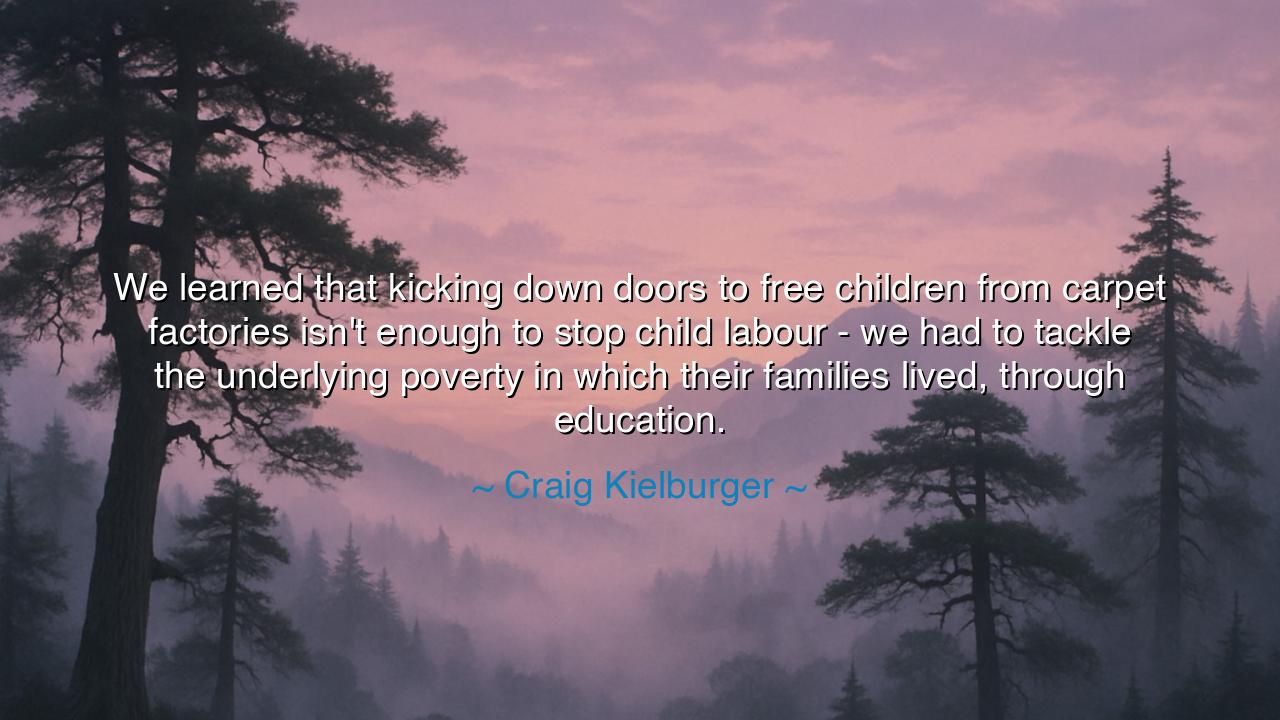
We learned that kicking down doors to free children from carpet
We learned that kicking down doors to free children from carpet factories isn't enough to stop child labour - we had to tackle the underlying poverty in which their families lived, through education.






“We learned that kicking down doors to free children from carpet factories isn't enough to stop child labour — we had to tackle the underlying poverty in which their families lived, through education.” – Craig Kielburger
In this moving reflection, Craig Kielburger, a man who began his crusade against child exploitation as a boy himself, reveals a truth both simple and profound: that the roots of suffering run deeper than the chains we can see. His words carry the weight of hard-won wisdom—born not from comfort, but from years spent walking among those trapped by the invisible bonds of poverty. He reminds us that compassion without understanding is incomplete, that liberation without transformation is fleeting. To rescue a child from bondage is noble; to break the cycle that placed them there is divine.
The meaning of this quote lies in its distinction between reaction and restoration. To “kick down doors” is to confront evil directly, to tear down the immediate walls of injustice. Yet as Kielburger discovered, those doors open only into deeper rooms of despair unless the causes of misery are confronted. Child labour is not merely a crime—it is a symptom. Its roots lie in hunger, ignorance, and the despair of parents who must choose survival over morality. Without addressing these foundations, every rescue becomes temporary, every act of charity a fleeting bandage upon a gaping wound.
The origin of this wisdom comes from Kielburger’s own journey. As a twelve-year-old, he read of a Pakistani child named Iqbal Masih, who had been sold into bondage in a carpet factory and later murdered for speaking against his oppressors. Outraged, Kielburger began to fight child labour, traveling across the world to meet children like Iqbal—faces smudged with dust, hands scarred by endless work. At first, he believed rescue alone was salvation. But over time, he saw those same children replaced by others, drawn back into the same despair. The cycle continued, because poverty and ignorance remained unbroken. Thus he learned the greater truth: that real freedom is not the breaking of chains, but the building of hope.
History echoes this lesson. In the wake of slavery’s abolition in the 19th century, nations rejoiced, believing bondage had ended. Yet many freed people remained trapped in poverty, exploited by systems that offered no education or opportunity. The body was free, but the spirit remained enslaved. So too with child labour: one may free a child from a factory, but if the family cannot feed itself, another will take their place. Only education—the slow, patient work of enlightenment—can sever this lineage of despair. For where knowledge takes root, dignity follows; where understanding blooms, oppression withers.
Kielburger’s insight also carries a moral challenge. It demands that we move beyond the thrill of rescue into the discipline of rebuilding. To tackle underlying poverty is to confront the uncomfortable truths of inequality, greed, and indifference. It is to look beyond the spectacle of suffering and see the systems that sustain it. Many wish to be heroes for a moment; few are willing to be builders for a lifetime. Yet the true hero, as he shows us, is not the one who bursts through the door, but the one who stays behind to teach, to listen, to uplift, and to plant the seeds of lasting change.
There is a quiet power in this vision—a shift from saving others to empowering them. When a child learns to read, the world itself begins to open before them. When a family learns a trade, the cycle of dependency breaks. And when a community learns to dream, no chain can hold it down. Kielburger’s faith in education as the path to liberation reminds us that knowledge is the only revolution that never sheds blood yet transforms every generation. The truest way to fight injustice is to replace despair with opportunity.
The lesson, then, is timeless: compassion must be joined with wisdom. It is not enough to fight the darkness; we must also light the path forward. Rescue without reform, passion without patience, cannot heal what generations of injustice have wrought. Each of us, in our own way, must become both liberator and educator—to act with heart, but also with understanding. Let us remember that true freedom is not the act of saving a life for a day, but the work of changing a destiny for all time. For as Craig Kielburger teaches, it is through education—not rescue alone—that humanity learns to walk out of its own shadow, and into the dawn of dignity.






AAdministratorAdministrator
Welcome, honored guests. Please leave a comment, we will respond soon